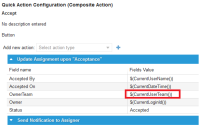Service Manager
CurrentUserTeam
Returns the primary team for the user associated with the current session, as defined in the Team field under the Details tab on the Employee Details form.
Use this function to return the name of the primary team.
Use the CurrentUserTeamNames function to return a list of all the team names.
Use the CurrentUserTeamIds function to return a list of the team IDs for all the teams.
Syntax
CurrentUserTeam()
Enabled For
For a description of the business object categories, see Notes on "Enabled For".
| Business Object Category | Yes/No |
|---|---|
| Business Rules: Before-Save Rules | Yes1 |
| Business Rules: Calculation Rules (After Save, with or without Also Recalculate on Load) | Yes1 |
| Business Rules: Calculation Rules (Before Save or Always, without Also Recalculate On Load) | Yes1 |
| Business Rules: Calculation Rules (Before Save or Always, with Recalculate On Load) | Yes1 |
| Business Rules: Editing Rules | Yes1 |
| Business Rules: Initialization Rules | Yes1 |
| Business Rules: Read Only Rules | Yes1 |
| Business Rules: Required Rules | Yes1 |
| Business Rules: Validation Rules | Yes1 |
| Client Expressions | Yes |
| Object Permissions | Yes |
| Services | Yes |
| LDAP | Yes |
| Mobile | Yes |
| Quick Actions (except UI Quick Actions) | Yes1 |
| UI Quick Actions | Yes |
| Reports | Yes1 |
| Search/Dashboard without field references | Yes1 |
| Search/Dashboard with field references | Yes1 |
| 1. Except in services. | |
Parameters
| none |
Return Value
Text value.
Example
$(CurrentUserTeam())
If the current session is for a user who is part of the service desk team, the above example returns "Service Desk".
CurrentUserTeam() Example
The above quick action sets the team of the current session as the task team when the task is accepted.
Was this article useful?
Copyright © 2019, Ivanti. All rights reserved.
